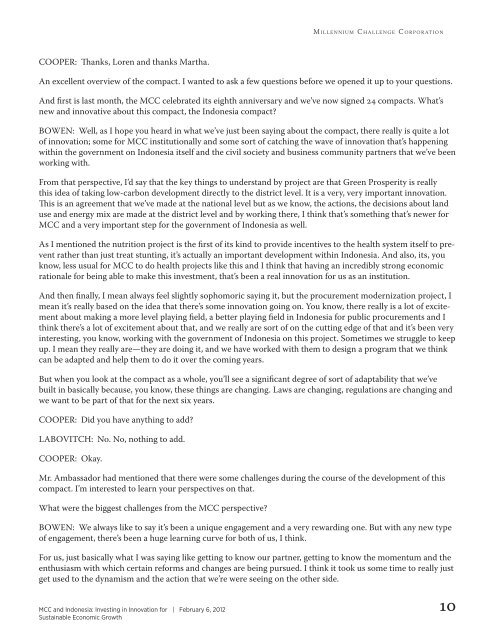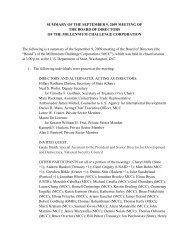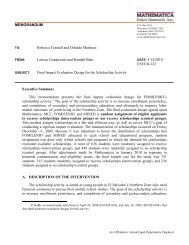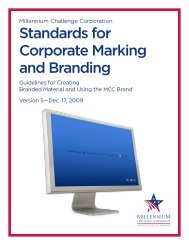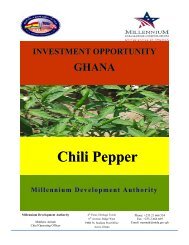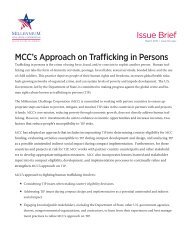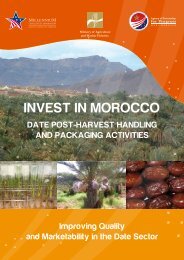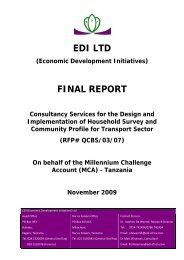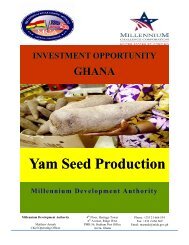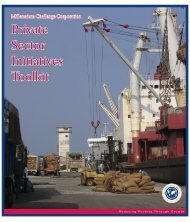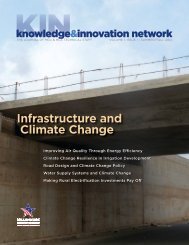Transcript - Millennium Challenge Corporation
Transcript - Millennium Challenge Corporation
Transcript - Millennium Challenge Corporation
You also want an ePaper? Increase the reach of your titles
YUMPU automatically turns print PDFs into web optimized ePapers that Google loves.
COOPER: Thanks, Loren and thanks Martha.<br />
An excellent overview of the compact. I wanted to ask a few questions before we opened it up to your questions.<br />
And first is last month, the MCC celebrated its eighth anniversary and we’ve now signed 24 compacts. What’s<br />
new and innovative about this compact, the Indonesia compact?<br />
BOWEN: Well, as I hope you heard in what we’ve just been saying about the compact, there really is quite a lot<br />
of innovation; some for MCC institutionally and some sort of catching the wave of innovation that’s happening<br />
within the government on Indonesia itself and the civil society and business community partners that we’ve been<br />
working with.<br />
From that perspective, I’d say that the key things to understand by project are that Green Prosperity is really<br />
this idea of taking low-carbon development directly to the district level. It is a very, very important innovation.<br />
This is an agreement that we’ve made at the national level but as we know, the actions, the decisions about land<br />
use and energy mix are made at the district level and by working there, I think that’s something that’s newer for<br />
MCC and a very important step for the government of Indonesia as well.<br />
As I mentioned the nutrition project is the first of its kind to provide incentives to the health system itself to prevent<br />
rather than just treat stunting, it’s actually an important development within Indonesia. And also, its, you<br />
know, less usual for MCC to do health projects like this and I think that having an incredibly strong economic<br />
rationale for being able to make this investment, that’s been a real innovation for us as an institution.<br />
And then finally, I mean always feel slightly sophomoric saying it, but the procurement modernization project, I<br />
mean it’s really based on the idea that there’s some innovation going on. You know, there really is a lot of excitement<br />
about making a more level playing field, a better playing field in Indonesia for public procurements and I<br />
think there’s a lot of excitement about that, and we really are sort of on the cutting edge of that and it’s been very<br />
interesting, you know, working with the government of Indonesia on this project. Sometimes we struggle to keep<br />
up. I mean they really are—they are doing it, and we have worked with them to design a program that we think<br />
can be adapted and help them to do it over the coming years.<br />
But when you look at the compact as a whole, you’ll see a significant degree of sort of adaptability that we’ve<br />
built in basically because, you know, these things are changing. Laws are changing, regulations are changing and<br />
we want to be part of that for the next six years.<br />
COOPER: Did you have anything to add?<br />
LABOVITCH: No. No, nothing to add.<br />
COOPER: Okay.<br />
Mr. Ambassador had mentioned that there were some challenges during the course of the development of this<br />
compact. I’m interested to learn your perspectives on that.<br />
What were the biggest challenges from the MCC perspective?<br />
BOWEN: We always like to say it’s been a unique engagement and a very rewarding one. But with any new type<br />
of engagement, there’s been a huge learning curve for both of us, I think.<br />
For us, just basically what I was saying like getting to know our partner, getting to know the momentum and the<br />
enthusiasm with which certain reforms and changes are being pursued. I think it took us some time to really just<br />
get used to the dynamism and the action that we’re were seeing on the other side.<br />
MCC and Indonesia: Investing in Innovation for | February 6, 2012<br />
Sustainable Economic Growth<br />
10


